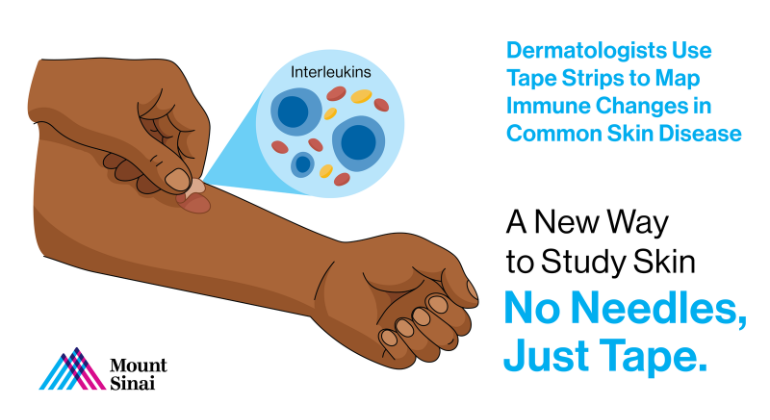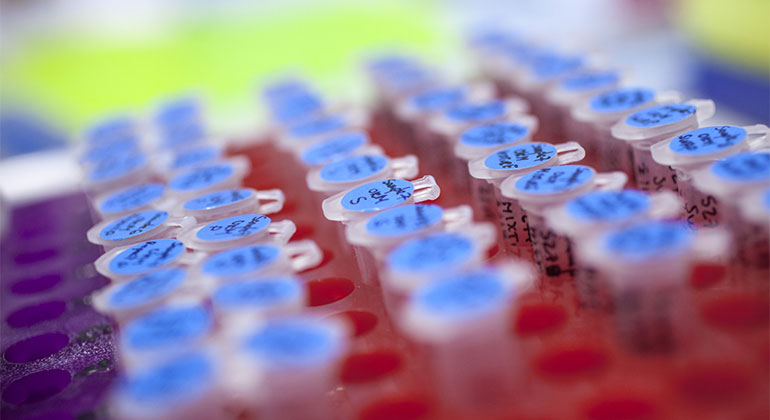Mount Sinai Researcher Receives NIH Award to Study Immune Responses of Patients With Inflammatory Skin Diseases in the Setting of COVID-19 Infection
Patients with moderate to severe atopic dermatitis (also known as eczema) who take a biologic treatment such as dupilumab seem to be protected from developing serious complications of COVID-19 and are also less likely to be hospitalized due to complications. Now, researchers from the Icahn School of Medicine at Mount Sinai have received a grant from the National Institutes of Health (NIH) on behalf of the National Institute of Allergy and Infectious Disease (NIAID) to study the immune responses of these patients in the setting of COVID-19 infection.
This two-year award is an addition to a seven-year grant also awarded by the NIH/NIAID to study mechanisms leading to variations in atopic dermatitis phenotypes. The total grant amounts to over $2 million.
The study will aim to understand whether systemic medications and biologics, such as dupilumab—a monoclonal antibody that binds to an inflammatory molecule, IL-4 receptor alfa, and inhibits the inflammatory response that leads to rashes and itching from atopic dermatitis/eczema—may have a positive or negative impact on COVID-19 responses in patients who have the disease.
“This research project has the potential to directly impact the medical care of tens of thousands of patients in the United States with atopic dermatitis on systemic medications in the setting of the COVID-19 pandemic, reducing morbidity and mortality, particularly in populations disproportionately affected, such as African Americans,” said Emma Guttman-Yassky, MD, PhD, Sol and Clara Kest Professor of Dermatology and Vice Chair of the Department of Dermatology at Icahn School of Medicine at Mount Sinai and grant recipient.
According to Dr. Guttman-Yassky, ethnic populations including African Americans are more affected by severe atopic dermatitis/eczema and also have a higher prevalence of asthma along with other risk factors such as diabetes and hypertension.
Dr. Guttman-Yassky hopes the study will help to determine whether systemic treatments, including specific monoclonal antibodies impact responses to COVID-19 infection, and whether some of these treatments can protect from deleterious COVID-19 effects.
“Understanding these immune responses in the presence of patients with atopic dermatitis is extremely important as it will help to guide how we treat patients with COVID-19 during this very critical period and help provide a possible new treatment directed towards this virus,” she said.
Mount Sinai’s dermatology practices have more than 1,200 moderate-to-severe atopic dermatitis patients who are taking dupilumab. And while the data is still preliminary, according to Dr. Guttman-Yassky, no patients have been reported in her practice as being hospitalized with COVID-19, although many have been exposed to the disease.
With such a large database of Mount Sinai patients with atopic dermatitis, Dr. Guttman-Yassky also hopes to determine ethnic differences in mounting COVID-19 responses in the setting of systemic and biologic treatments.
“Having a better understanding of differential immune responses mounted to COVID-19 may offer a basis for evaluating additional therapeutic approaches for this disease and other infections,” she said.
About the Mount Sinai Health System
Mount Sinai Health System is one of the largest academic medical systems in the New York metro area, with 48,000 employees working across seven hospitals, more than 400 outpatient practices, more than 600 research and clinical labs, a school of nursing, and a leading school of medicine and graduate education. Mount Sinai advances health for all people, everywhere, by taking on the most complex health care challenges of our time—discovering and applying new scientific learning and knowledge; developing safer, more effective treatments; educating the next generation of medical leaders and innovators; and supporting local communities by delivering high-quality care to all who need it.
Through the integration of its hospitals, labs, and schools, Mount Sinai offers comprehensive health care solutions from birth through geriatrics, leveraging innovative approaches such as artificial intelligence and informatics while keeping patients’ medical and emotional needs at the center of all treatment. The Health System includes approximately 9,000 primary and specialty care physicians and 10 free-standing joint-venture centers throughout the five boroughs of New York City, Westchester, Long Island, and Florida. Hospitals within the System are consistently ranked by Newsweek’s® “The World’s Best Smart Hospitals, Best in State Hospitals, World Best Hospitals and Best Specialty Hospitals” and by U.S. News & World Report's® “Best Hospitals” and “Best Children’s Hospitals.” The Mount Sinai Hospital is on the U.S. News & World Report® “Best Hospitals” Honor Roll for 2025-2026.
For more information, visit https://www.mountsinai.org or find Mount Sinai on Facebook, Instagram, LinkedIn, X, and YouTube.

Mount Sinai Dermatologists Use Tape Strips to Map Immune Changes in Common Skin Disease
Jun 10, 2025 View All Press Releases

